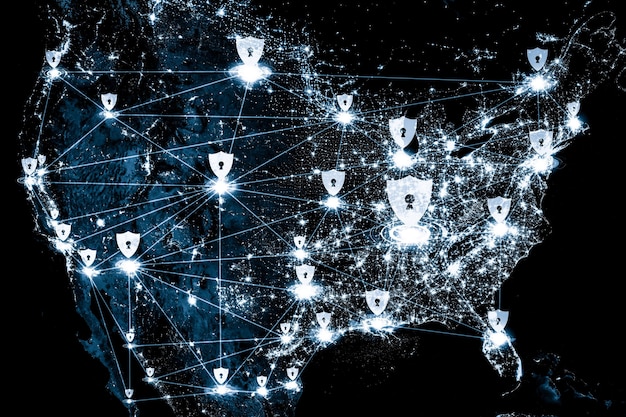New Federal Data Privacy Regulations in 2025: What You Need to Know

Anúncios
New Federal Regulations on Data Privacy in 2025 are poised to reshape how personal information is handled across the United States, impacting businesses and individuals alike, with significant implications for data security, consumer rights, and international data transfers.
The landscape of data privacy is rapidly evolving. As we approach 2025, new Federal Regulations on Data Privacy: What the Changes Mean for You in 2025 are set to bring significant changes to how personal information is collected, used, and protected across the United States.
Anúncios
Understanding the Impetus Behind New Federal Data Privacy Regulations
The push for stronger federal data privacy regulations stems from a growing need to harmonize the patchwork of state laws currently governing data protection in the U.S. Consumers are increasingly concerned about how their data is being used, and businesses face challenges in complying with varied and sometimes conflicting state requirements.
Several factors are contributing to this regulatory shift. Increased awareness of data breaches, the rise of sophisticated data analytics, and the influence of international data protection laws like the GDPR are all playing a role.
Anúncios

The goal is to create a more consistent and comprehensive framework that protects consumer privacy while fostering innovation and economic growth.
Key Drivers of Change
The current state of data privacy in the United States is characterized by a mix of federal and state laws, with no single overarching federal law akin to Europe’s GDPR. This decentralized approach has led to several challenges.
- Inconsistent Standards: Different states have different rules, creating compliance headaches for businesses operating across multiple states.
- Enforcement Challenges: The lack of a unified federal law makes it difficult for regulators to effectively enforce data privacy protections.
- Consumer Confusion: Consumers are often unsure of their rights and how to exercise them.
The new federal regulations aim to address these challenges by establishing a baseline level of data protection that applies across the country.
The rise in awareness of data breaches and the increasing sophistication of data analytics techniques have also fueled the demand for stronger data privacy protections.
Ultimately, these regulations reflect a growing consensus that data privacy is a fundamental right that needs to be protected.
This overview highlights why these new regulations on federal data privacy are becoming law. The move will bring about some big shifts in how the internet works and how businesses operate.
Core Components of the 2025 Federal Data Privacy Framework
The proposed Federal Data Privacy Framework for 2025 encompasses several core components designed to provide comprehensive data protection. These components address various aspects of data collection, use, and security, aiming to empower individuals and hold organizations accountable.
Understanding these components is essential for both consumers and businesses to navigate the evolving data privacy landscape.
Data Minimization and Purpose Limitation
This principle requires organizations to collect only the data that is strictly necessary for a specified purpose and to use that data only for that purpose. This is meant to prevent organizations from accumulating excessive amounts of personal data and using it in ways that are unexpected or harmful.
For example, a retailer might collect a customer’s email address to send order confirmations but should not use that email address to send unsolicited marketing materials unless the customer has explicitly consented.
Enhanced Transparency and Control
Individuals will have greater access to information about what data is being collected about them and how it is being used. They will also have more control over their data, including the right to access, correct, and delete their personal information.
This includes plain language explanations of data privacy policies and easy-to-use mechanisms for exercising data rights.

Data Security and Breach Notification
The framework will mandate stronger data security standards to protect personal information from unauthorized access, use, or disclosure. It will also require organizations to notify individuals promptly in the event of a data breach that compromises their personal information.
- Encryption Standards: Requiring the use of encryption to protect data at rest and in transit.
- Security Assessments: Mandating regular security assessments to identify and address vulnerabilities.
- Breach Notification Timelines: Establishing clear timelines for notifying individuals and regulators in the event of a data breach.
Organizations failing to comply with the new federal regulations will be exposed to large fines and penalties. In addition, they will be subject to consumer lawsuits.
These core components will change how organizations handle data and give consumers more control over their personal information.
Impact on Businesses: Compliance and Adaptation
The new Federal Regulations on Data Privacy will require businesses to adapt their practices and prioritize compliance. This will likely involve significant investments in technology, processes, and personnel to meet the new requirements.
Businesses that proactively embrace these changes will be better positioned to gain a competitive advantage and build trust with consumers.
Developing a Compliance Strategy
Businesses should start by conducting a thorough assessment of their current data privacy practices to identify gaps and areas for improvement. This assessment should consider all aspects of data collection, use, and storage.
It’s important to engage legal counsel and data privacy experts to ensure that the compliance strategy is comprehensive and effective.
Implementing New Technologies and Processes
Businesses may need to invest in new technologies and processes to support compliance. This could include data discovery tools, consent management platforms, and data security solutions.
- Data Mapping: Understanding where personal data is stored and how it flows through the organization.
- Consent Management: Obtaining and managing consent for data collection and use.
- Data Security: Implementing appropriate security measures to protect personal data.
Investing in data privacy will also improve customer loyalty as customers will be more inclined to remain loyal to a business that handles their personal information responsibly.
The new federal regulations on data privacy will impact both large and small businesses.
How the Regulations Empower Individuals and Protect Consumer Rights
A central goal of the new Federal Regulations on Data Privacy is to empower individuals and protect their consumer rights. By granting individuals greater control over their personal information, the regulations aim to foster trust and transparency in the digital marketplace.
These regulations will help customers feel more confident about providing their information to business and online service providers.
Right to Access and Correct Data
Individuals will have the right to access their personal data held by organizations and to correct any inaccuracies. This empowers individuals to ensure that their information is accurate and up-to-date.
Organizations will be required to provide individuals with easy-to-use mechanisms for exercising these rights.
Right to Data Portability
Individuals will have the right to obtain their personal data in a portable format, allowing them to transfer their data to another service provider. This promotes competition and innovation by making it easier for individuals to switch between services.
This right is particularly important in industries where data portability can facilitate competition and consumer choice.
Right to Object and Opt-Out
Individuals will have the right to object to the processing of their personal data for certain purposes, such as direct marketing. They will also have the right to opt-out of the sale of their personal data.
These rights will give individuals greater control over how their data is used for commercial purposes.
These new regulations will offer consumers more rights and they will have more control over their personal data.
International Data Transfers and the Federal Standard
The new Federal Regulations on Data Privacy also address the issue of international data transfers. With the increasing globalization of data flows, it is important to ensure that personal data transferred outside the U.S. is subject to adequate protection.
The regulations aim to establish a federal standard for international data transfers that is consistent with international norms and provides a level playing field for U.S. businesses.
Establishing Adequacy Standards
The regulations may establish adequacy standards for countries to which personal data is transferred. This means that data can only be transferred to countries that provide a level of data protection that is “essentially equivalent” to that provided under the U.S. federal law.
This approach is similar to that used by the European Union under the GDPR.
Implementing Standard Contractual Clauses
In cases where a country does not meet the adequacy standard, organizations may be able to use standard contractual clauses (SCCs) to ensure adequate data protection. SCCs are pre-approved contracts that impose specific data protection obligations on the parties involved in the data transfer.
The regulations may provide guidance on the use of SCCs and other transfer mechanisms.
Promoting International Cooperation
The regulations may also promote international cooperation on data privacy issues. This could involve working with other countries to develop common data protection standards and facilitate cross-border enforcement.
Given the borderless nature of the internet, international cooperation is essential for effective data privacy protection.
This will set the standard for protecting user information as it crosses international borders.
Preparing for 2025: Steps to Take Now
As 2025 approaches, it is important for both individuals and businesses to take steps now to prepare for the new Federal Regulations on Data Privacy. Proactive preparation will help ensure a smooth transition and minimize the risk of non-compliance.
Taking steps now will help make sure you’re ready and able to adapt to coming shifts in data privacy regulations.
For Individuals
Individuals should take steps to understand their data privacy rights and how to exercise them. This includes reviewing privacy policies, adjusting privacy settings, and using privacy-enhancing technologies.
- Review Privacy Policies: Take the time to read and understand the privacy policies of the websites and services you use.
- Adjust Privacy Settings: Configure your privacy settings to limit the amount of data you share with websites and apps.
- Use Privacy-Enhancing Technologies: Consider using tools like VPNs, ad blockers, and privacy-focused browsers to protect your online privacy.
For Businesses
Businesses should begin developing a compliance strategy, assessing their current data privacy practices, and implementing new technologies and processes.
This includes things like assessing current data privacy practices, implementing new technologies and processes, and building a culture of data privacy within the organization.
- Conduct a Data Privacy Assessment: Identify gaps and areas for improvement in your current data privacy practices.
- Develop a Compliance Strategy: Create a comprehensive plan for meeting the requirements of the new federal regulations.
- Build a Culture of Data Privacy: Train employees on data privacy principles and promote a culture of responsible data handling.
Taking these actions will lead to more peace of mind for everyone involved.
| Key Element | Brief Description |
|---|---|
| 🔒 Enhanced Security | Mandates robust data security measures for protecting personal data. |
| ✅ Data Control | Gives individuals more control over their personal information. |
| 🌍 Global Standard | Sets norms for international data transfers to safe countries. |
| 💼 Business Impact | Requires corporate compliance adaptations for data management. |
FAQ
▼
The primary goals are to establish a national standard for data privacy, protect consumer rights, and address the challenges posed by the current patchwork of state laws.
▼
Businesses will need to adapt their data practices to comply with the new regulations, which may require investments in technology, processes, and employee training.
▼
Individuals will gain enhanced rights to access, correct, and delete their personal data, as well as the right to data portability and the ability to opt-out of certain data processing activities.
▼
The regulations will establish a federal standard for international data transfers, potentially requiring data to be transferred only to countries with adequate data protection standards.
▼
Individuals should review privacy policies, adjust privacy settings, and consider using privacy-enhancing technologies to protect their personal data online.
Conclusion
The upcoming Federal Regulations on Data Privacy in 2025 represent a significant shift in the data privacy landscape. By understanding the core components of the framework and taking proactive steps to comply, organizations and individuals can navigate the evolving data landscape. This will lead to creating a more transparent and trustworthy digital ecosystem, benefiting everyone who surfs the internet.





